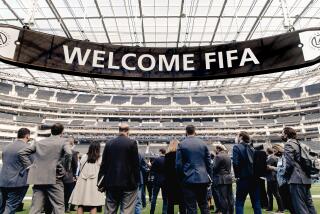FIFA Talk Is Too Little, Too Late for 2006
So, FIFA is thinking about locking the gate now that the fox has safely fled with the chickens.
Germany has its World Cup, South Africa is left with nothing and the powers that be in Zurich, Switzerland, are belatedly contemplating a change in the way soccer’s quadrennial world championship is awarded.
Too bad Joseph “Sepp” Blatter and his pals didn’t think of that before last week’s farce, when, on a 12-11 vote amid allegations of overzealous arm-twisting and influence-peddling reminiscent of the International Olympic Committee scandal of two years ago, the Germans were awarded the right to stage the 2006 tournament.
No one questions their ability to do the job properly. Many question whether they should have been given the opportunity.
The ink was no sooner dry on the 2006 documents when Lennart Johansson, the Swedish president of UEFA, European soccer’s ruling body, began calling for Africa to get the 2010 tournament and also asking for the rules to be rewritten.
“The experience of the campaign to host 2006 has confirmed my belief in the need for a rotation system to be introduced for future competitions,” Johansson said.
This week, FIFA’s president jumped into the fray.
“FIFA should not repeatedly grant the World Cup to the same continents but, on the contrary, should be entrusting its flagship competition to different confederations,” Blatter said in a letter to FIFA’s 24-member executive committee, which decides such matters.
Straightforward rotation seems unlikely since it would deprive Europe, the sport’s home and its strongest base, of staging the event more than once every 20 or 24 years, depending if Oceania is included in the rotation.
Other possibilities to be discussed at an executive committee meeting on Aug. 3 include limiting the number of candidates to one per continental confederation and simultaneously awarding two consecutive World Cups.
Both moves would be a step forward.
THE DEUTCHMARK CUP?
Britain’s Sunday Times has pointed out that, in the two weeks before FIFA’s vote, German multinational corporations invested more than $3 billion in three countries whose ballots decided the result.
For example, it said the German government had agreed to the sale of 1,200 anti-tank rocket launchers to Saudi Arabia. No cost was disclosed, but they weren’t inexpensive.
In South Korea, DaimlerChrysler AG, one of half a dozen sponsors of the German bid, announced a $450-million stake in the car maker Hyundai; and BASF, a chemical company, announced an investment of $375 million.
In Thailand, Siemens announced a $1.5-billion investment in mobile phones across Asia. Bayer AG, another German-bid sponsor, announced the opening of an herbicide plant and the tripling of production at its polycarbonate factory.
The four executive committee members from the Middle East and Asia--Mohammed Bin Hammam of Qatar, Abdullah Al-Dabal of Saudi Arabia, Chung Mong-joon of South Korea and Worawi Makudi of Thailand--each are reported to have cast their votes for Germany.
“There is no evidence that the announcements of investment in Asia [and the Middle East] were coordinated or influenced by the World Cup vote,” the newspaper said, but pointed out that the deals “underlined the importance to Asian [and Middle Eastern] countries of their ties with Germany.”
Hmmm.
NO CHANCE OF CHANGE
An editorial in Britain’s Sunday Times has called for FIFA to revisit its vote.
“Selection of sites for international sporting events is rarely free from controversy,” the London newspaper stated. “Bribery, corruption, cronyism, gullibility and racism are charges regularly flung around in the aftermath by disappointed parties, whether arguing about the site for the Olympics or the world hopscotch championships.”
South Africa, it said, should have been--and still should be--given the 2006 event because “hosting the tournament would have given a huge boost to a country that is struggling to avoid economic mayhem and a slide toward the chaos of its northern neighbors.
“The northern hemisphere should have taken a back seat for the 2006 World Cup--and that includes England’s ill-judged bid.
“As Mr. Blatter said before the result was announced, the choice was between being ‘innovative, investing in courage and a new continent or sticking with the established football powers.’ A pity then, that FIFA did not stick to the spirit of these remarks and pick South Africa. It should find a way of reversing its decision and promoting the game worldwide.”
Not a chance, FIFA said Tuesday.
“For legal reasons, the vote is over, it’s final,” FIFA spokesman Andreas Herren said.
AND IN NEW ZEALAND
Charles Dempsey will not have enjoyed the editorial written about him in the New Zealand Herald, the country’s most influential newspaper.
Dempsey, the 78-year-old FIFA executive committee member who abstained rather than vote for South Africa as instructed by the Oceania confederation, was blasted in no uncertain terms.
“Dempsey has given no satisfactory explanation of his appalling misjudgment,” the Herald stated. “In reality, there is none. At best, an elderly man’s nerves failed him. At worst, and in greater likelihood, this was an administrator arrogantly disregarding the wishes of those he represents.”
Dempsey since has said he will resign from all soccer duties by Oct. 1.
“South Africans have every right to see him as the man who cheated them of a dream,” the Herald concluded.
(BEGIN TEXT OF INFOBOX / INFOGRAPHIC)
FIFA World Rankings
The European Championship caused considerable reshuffling of FIFA’s monthly ranking of its 203 national teams, with Italy, Portugal and the Netherlands rising rapidly and France closing in on Brazil. This is where the leading teams stood as of July 5:
*--*
Rk. Pr. Country Points 1. 1. Brazil 825 2. 2. France 808 3. 3. Czech Republic 753 4. 4. Spain 744 4. 5. Argentina 744 6. 14. Italy 732 7. 15. Portugal 717 8. 21. Netherlands 713 9. 6. Germany 711 10. 7. Norway 708 11. 10. Yugoslavia 705 12. 11. Romania 701 13. 8. Mexico 698 14. 9. Croatia 694 15. 12. England 691 16. 13. Denmark 653 17. 18. Colombia 650 18. 16. Sweden 645 19. 17. Paraguay 642 20. 19. United States 639 21. 21. Scotland 629 22. 23. Chile 625 23. 20. South Africa 624 24. 24. Russia 616 25. 26. Morocco 607
*--*






